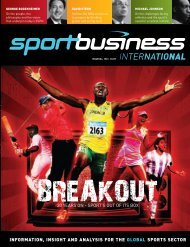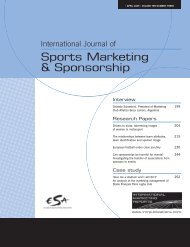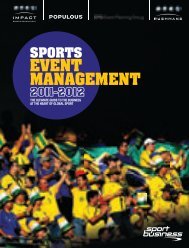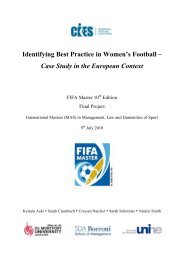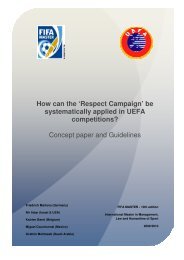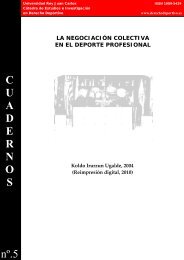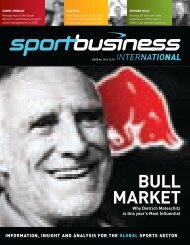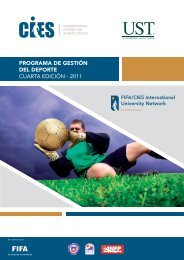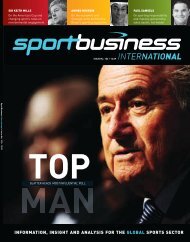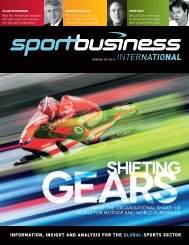Sports Marketing & Sponsorship - FIFA/CIES International University ...
Sports Marketing & Sponsorship - FIFA/CIES International University ...
Sports Marketing & Sponsorship - FIFA/CIES International University ...
- No tags were found...
You also want an ePaper? Increase the reach of your titles
YUMPU automatically turns print PDFs into web optimized ePapers that Google loves.
Sporting involvement and alcohol sponsorshipRESEARCH PAPERperformance and the many sportsmen whose careershave been affected by alcohol problems, linkingalcohol and sport sends the wrong message. Evensmall quantities of alcohol may impact on sportingperformance through impairing coordination andmotor ability, inducing dehydration, interfering withthe body’s temperature regulation, lowering bloodsugar levels or impairing judgment (Edwards, 2000,p.10; Stainback, 1997, pp.49-63). Most medicalcoaching advice is that serious athletes shouldabstain from alcohol, or at least consume onlyminimal amounts (e.g. Berning, 1996), yet there arefrequent reports of alcohol-fuelled behaviour by highprofilesportsmen. Williams (2000) describes some ofthe difficulties faced by coaches in moderating thedrinking of young footballers in the face of suchexamples.However, opponents of a sponsorship ban do notaccept that alcohol sponsorship is a factor inencouraging underage drinking. They believe that theproblems are social, caused by the irresponsibility ofthose who insist on drinking to excess, and youngpeople’s disregard for the law (Kolah, 2007). Therecent banning of tobacco sponsorship caused greatdifficulties for sports such as snooker, which reliedheavily upon such sponsorship, and a ban on alcoholsponsorship would affect almost all UK sports in someway. While prominent teams and events such asLiverpool FC or the John Smith’s Grand Nationalmight be prestigious enough to be able to attractalternative sponsors, it could well be the less highprofilesports and events which would suffer most,thus decreasing sporting opportunities for youngpeople. This would be a high price to pay if no effectswere seen upon alcohol consumption. Moreover,McDaniel and Mason (1999) found greater publicacceptance for an association of beer with sport thanfor an association of tobacco with sport; although theysuggest this might show respondents were notsufficiently concerned about the public health risks ofalcohol, it might also indicate that a sponsorship ban,and any possible consequences, would not be wellreceived by the public.Lancaster and Lancaster’s (2003) meta-analysis ofstudies on tobacco advertising certainly casts doubt onwhether a sponsorship ban would have any effect.Their analysis of full or partial advertising bans ontobacco showed that in only 29% of cases wasconsumption significantly reduced; their belief,supported by a similarly low rate of positive correlationbetween tobacco advertising and consumption, is thatadvertising bans have little or no influence on tobaccodemand because the advertising itself has minimalinfluence. Dorsett and Dickerson (2004) also found nostatistical relationship between UK alcohol advertisingand consumption. Although their research onlyincluded persons over 18, their conclusions aresupported by Martino et al (2006), whose study ofYear 8/9 pupils (aged 12-14) showed that peers andimportant adults were the greatest influencers ofalcohol-related beliefs, with advertising reinforcingpositive attitudes only in those who were alreadydrinkers.Two experimental studies (McDaniel & Heald, 2000;Christensen, 2006) have considered sponsorship linksbetween healthy pursuits and unhealthy products.Both found that incongruence was perceived, withChristensen stating that because there were largedifferences in both emotional and attitudinal responsesto sponsor (tobacco) and sponsee (sports event), thepartnership would be rejected in the consumer’s mindand no change would take place in their response tothe sponsor. McDaniel and Heald suggest usingmarketing communications techniques rather thanbans to negate any effects from an unhealthy productsponsor, for instance highlighting the incongruity of anunhealthy product sponsorship through public serviceadvertising, or ensuring that sporting organisationswith unhealthy product sponsors balanced this withthe communication of health-related messages. Thistype of strategy has to some extent been adopted bysponsors keen to be seen as promoting responsibledrinking: for instance Coors, owner of the Carlingbrand, which sponsors Glasgow Celtic and GlasgowRangers, have featured the managers of these clubs inalcohol responsibility advertisements (Murden, 2004);28 <strong>International</strong> Journal of <strong>Sports</strong> <strong>Marketing</strong> & <strong>Sponsorship</strong> ● OCTOBER 2009 ●




